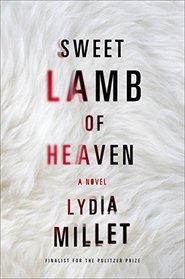I really didn't understand the whole premise of the voices heard.
Anna has taken her daughter, Lena, away from her husband. He never wanted and didn't show any affection for their daughter and Anna had to get away. She ends up in Maine with like-minded people who have experienced the voices also.
There are incidences with her husband finding them and using his control over them.
Just a weird, but good to read book.
Anna has taken her daughter, Lena, away from her husband. He never wanted and didn't show any affection for their daughter and Anna had to get away. She ends up in Maine with like-minded people who have experienced the voices also.
There are incidences with her husband finding them and using his control over them.
Just a weird, but good to read book.
"Sweet Lamb of Heaven" provides the impression that it will be a typical "runaway abused wife" story, with the woman and children (in this case, a daughter, age 6) fleeing and the husband and/or his designees in pursuit. Anna's husband is connected, and is running for public office, and wants her and his daughter back to boost his public image. Anna, despite going off the grid, knows she cannot relax her vigilance.
That's how the book starts. Except, Anna has heard voices in the past. NOT psychotic voices that provided her with sketchy directions, but simply a voice one that only spoke when her infant daughter was awake and alert, and one that went away again when her daughter began to talk on her own. Anna knew it was real, because her husband heard it once, as well mistaking it for a blaring radio.
As the novel progresses, Anna and Lena settle into shelter in a Maine motel about as far from Ned's Anchorage base as they could get and still be in the USA. They get to know other guests that arrive, and those guests get to know them. And they discover a number of commonalities among them, not the least of which is their interest in protecting Anna and Lena from Ned and his minions.
I liked the book, but I didn't LOVE the book. I believe that the things I liked least about the book were the things that author Lydia Millet was most trying to communicate to the readership. The philosophy of language, and of community, the concept of good vs. evil as mirror images, and the contradictory emphases / equations of "good" = "substance" and "evil" = "image". Frankly, the books underlying themes challenged me to do a lot more thinking and analysis than I was prepared to invest at the time I read it.
The challenge for me is how to rate a book like this. I try not to let my biases interfere with the author's aims do I believe that the author successfully accomplished what I believe they were trying to do, AND did they do so in a way that their target readership will find satisfying. After thinking about it ... I believe that Ms. Millet managed to do this in large part, and this will be reflected in my rating.
RATING: 3 1/2 stars, rounded up to 4 stars where 1/2 stars are not permitted.
DISCLOSURE: I was awarded a free copy of this book in a random draw. No requirement of a review was made, let alone any conditions on the tone / content of a review, however, it was hinted that winners who write and post honest reviews have a better chance of being selected to receive future books.
That's how the book starts. Except, Anna has heard voices in the past. NOT psychotic voices that provided her with sketchy directions, but simply a voice one that only spoke when her infant daughter was awake and alert, and one that went away again when her daughter began to talk on her own. Anna knew it was real, because her husband heard it once, as well mistaking it for a blaring radio.
As the novel progresses, Anna and Lena settle into shelter in a Maine motel about as far from Ned's Anchorage base as they could get and still be in the USA. They get to know other guests that arrive, and those guests get to know them. And they discover a number of commonalities among them, not the least of which is their interest in protecting Anna and Lena from Ned and his minions.
I liked the book, but I didn't LOVE the book. I believe that the things I liked least about the book were the things that author Lydia Millet was most trying to communicate to the readership. The philosophy of language, and of community, the concept of good vs. evil as mirror images, and the contradictory emphases / equations of "good" = "substance" and "evil" = "image". Frankly, the books underlying themes challenged me to do a lot more thinking and analysis than I was prepared to invest at the time I read it.
The challenge for me is how to rate a book like this. I try not to let my biases interfere with the author's aims do I believe that the author successfully accomplished what I believe they were trying to do, AND did they do so in a way that their target readership will find satisfying. After thinking about it ... I believe that Ms. Millet managed to do this in large part, and this will be reflected in my rating.
RATING: 3 1/2 stars, rounded up to 4 stars where 1/2 stars are not permitted.
DISCLOSURE: I was awarded a free copy of this book in a random draw. No requirement of a review was made, let alone any conditions on the tone / content of a review, however, it was hinted that winners who write and post honest reviews have a better chance of being selected to receive future books.




